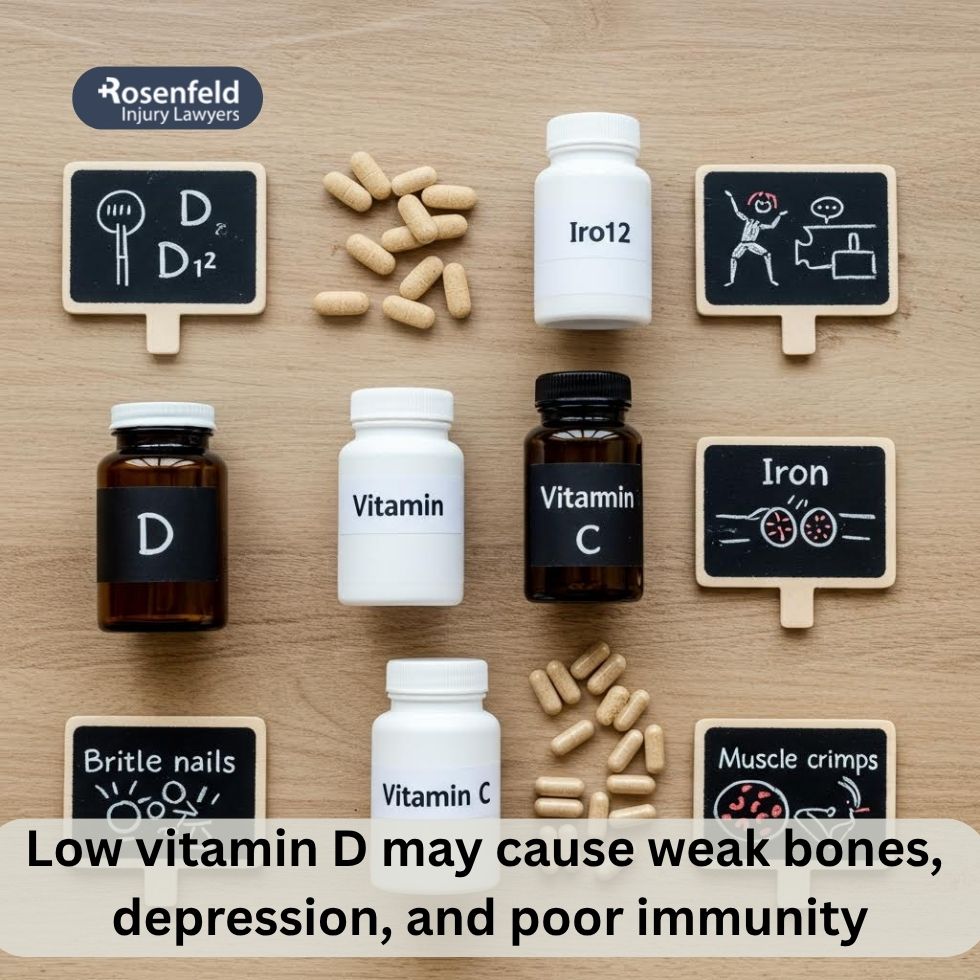- 24/7 Free Consultation: (888) 424-5757 Tap Here To Call Us
10 Most Common Nutrient Deficiencies

Even in a city like Chicago, where food options are plentiful, many people still struggle with some of the most common nutrient deficiencies. These shortfalls in essential nutrients can impact everything from energy levels to long-term disease risk.
Nursing home malnutrition cases are particularly alarming because they often go unnoticed and can quickly lead to serious health complications, including weakened immunity, muscle loss, and increased risk of hospitalization or death.

What Are Nutrient Deficiencies and Why Should You Care?
A nutrient deficiency occurs when the body doesn’t get or can’t absorb enough essential micronutrients to maintain optimal function. Essential nutrients are substances like vitamins and minerals that the body needs for metabolic processes, growth, and repair.
Without adequate levels, individuals may face fatigue, reduced immune function, and greater vulnerability to chronic illness. In more advanced cases, certain deficiencies may progress into more serious health problems.
Neurological Symptoms
Certain micronutrient deficiencies can affect the nervous system. A lack of vitamin B12, for example, may lead to numbness, tingling in the hands or feet, poor coordination, or memory problems.
Low levels of magnesium or vitamin E can also contribute to nervous system issues. Blood tests can pinpoint these deficiencies, especially when symptoms overlap with other health conditions.
Immune System Issues
A weak immune response could signal inadequate nutrient levels. If you’re getting sick more often, taking longer to recover, or dealing with frequent colds or infections, your immune system may not be functioning at full strength.
Vitamin D, zinc, iron, and vitamin C all play essential roles in immune defense. Identifying a deficiency early can reduce your risk of chronic illness or prolonged recovery.
Mood and Cognitive Changes
Mood swings, depression, anxiety, or problems with concentration may be connected to low nutrient intake. Deficiencies in B vitamins, iron, omega-3 fatty acids, and magnesium have been linked to cognitive decline and emotional instability.
These symptoms can be subtle or mistaken for mental health concerns alone, making it critical to explore whether a nutritional imbalance might be contributing.
Bone Pain and Weakness
Bone pain can be a red flag for a nutritional deficiency. Low levels of vitamin D, calcium, magnesium, or phosphorus may weaken bone structure or lead to conditions like osteomalacia or osteoporosis. If you’re experiencing aching bones, joint stiffness, or difficulty standing for long periods, it’s worth testing for deficiencies that affect skeletal health.

General Signs You Might Be Lacking Essential Nutrients
Nutritional deficiency often develops slowly and may not be immediately obvious. However, certain symptoms can signal that your nutrient consumption is falling short, especially if your diet lacks variety or you’re under chronic stress.
You may experience:
- Fatigue and weakness, even after adequate rest.
- Muscle cramps or spasms, usually due to low magnesium or potassium.
- Pale skin, which could indicate iron or B12 deficiency.
- Hair thinning or hair loss related to micronutrient deficiencies.
- Brittle nails that break or split easily.
- Frequent colds or infections, a sign of increased risk tied to low immunity.
- Mood swings, irritability, or even depression in cases of low vitamin D or omega-3 levels.
- Trouble focusing or mental fog, sometimes linked to poor nutrient absorption.
If these signs continue, it’s worth speaking with a healthcare provider about possible micronutrient deficiencies. A full blood panel can help assess your daily micronutrient consumption and identify imbalances before they lead to more serious health issues.
Here are some of the most common vitamin deficiencies:
#1 Iron Deficiency
Iron is critical for producing hemoglobin, a protein in red blood cells that transports oxygen. Iron deficiency is one of the most common deficiencies worldwide. It’s most prevalent in children, pregnant women, and those following vegetarian or vegan diets.
Iron deficiency anemia can result in fatigue, pale skin, dizziness, shortness of breath, and poor immune function. Heme iron (found in meat) and non-heme iron (from plant-based sources like beans and spinach) should be part of a varied diet to support iron absorption and prevent deficiency.
#2 Vitamin D Deficiency
Vitamin D deficiency can lead to bone pain, muscle weakness, fatigue, and frequent illness. It plays a critical role in calcium absorption, supports immune health, and helps regulate mood. These issues are particularly widespread during long Chicago winters, when limited sun exposure reduces the body’s natural ability to produce this core nutrient.
Vitamin D is found in fatty fish and fortified foods. Since it’s difficult to get enough through diet alone, healthcare providers frequently recommend vitamin D supplementation.
#3 Vitamin B12 Deficiency
A lack of vitamin B12 can interfere with nerve function, red blood cell production, and DNA synthesis. Because B12 is primarily found in animal products, this deficiency is often seen in older adults and individuals who follow plant-based diets.
Symptoms include fatigue, numbness or tingling in the extremities, memory problems, and mood changes. Enriched foods and supplements can help restore vitamin B12 levels, especially in those at increased risk.
#4 Calcium Deficiency
Calcium plays a key role in bone health, nerve signaling, and muscle function. When dietary calcium intake is low, the body compensates by pulling calcium from the bones, raising the risk of osteoporosis.
While calcium deficiency may not cause obvious symptoms immediately, it can lead to numbness, abnormal heart rhythms, or muscle spasms in severe cases. Dairy, dark green vegetables, and fortified foods are top calcium sources.
#5 Magnesium Deficiency
Magnesium is an essential mineral involved in over 300 enzyme reactions, including those related to energy production, nerve function, and bone health. Magnesium deficiency has been linked to type 2 diabetes, heart disease, and migraines.
Symptoms may include muscle cramps, fatigue, abnormal heart rhythms, and mood disturbances. Nuts, seeds, dark leafy greens, and whole grains can help improve magnesium intake.

#6 Iodine Deficiency
Iodine supports thyroid function and regulates metabolism, growth, and brain development. Iodine deficiency can lead to an enlarged thyroid (goiter), fatigue, weight gain, dry skin, and thinning hair.
Common sources include iodized salt, seaweed, fish, eggs, and dairy. Global health organizations consider iodine deficiency a major contributor to thyroid disorders.
#7 Folate Deficiency (Folic Acid)
Folate (vitamin B9) is crucial for DNA synthesis and cell division. Folic acid is the synthetic version used in supplements and fortified foods. Folate deficiency is particularly concerning for women of childbearing age, as it raises the risk of neural tube defects during pregnancy.
Symptoms include anemia, fatigue, irritability, and a smooth tongue. Leafy green vegetables, legumes, eggs, and fortified grains are excellent sources.
#8 Vitamin A Deficiency
Vitamin A is essential for vision, immune health, and skin integrity. It exists in two forms: preformed vitamin A (from animal sources) and beta-carotene (from plant foods). Though vitamin A deficiency is less common in the U.S., it remains a global concern.
Signs include night blindness, dry eyes, and an increased risk of infection. Top sources include liver, eggs, dairy, and orange or deeply colored greens.
#9 Vitamin C Deficiency
Vitamin C is a powerful antioxidant that also promotes collagen production and aids iron absorption. A severe deficiency leads to scurvy, which causes bleeding gums, fatigue, and poor wound healing.
Early signs of vitamin C deficiency include dry skin, frequent illness, and fatigue. Citrus fruits, berries, tomatoes, and bell peppers are rich in vitamin C.
#10 Potassium Deficiency
Potassium helps regulate fluid balance, muscle and nerve function, and blood pressure. Potassium deficiency may result from poor dietary intake, certain medications, or conditions that cause excessive fluid loss.
Symptoms include muscle weakness, fatigue, constipation, and in severe cases, irregular heartbeat. Bananas, potatoes, spinach, beans, and dairy products can support potassium intake.
Why Do These Common Nutrient Deficiencies Occur?
Many factors contribute to nutrient deficiencies, even in well-fed populations. These include:
- Inadequate intake of diverse, nutrient-dense foods
- Poor food quality or over-processing
- Restrictive or fad diets
- Absorption issues from gastrointestinal disorders (e.g., inflammatory bowel disease)
- Age-related absorption decline
- Certain medications that affect nutrient absorption or metabolism
- Increased needs during growth, pregnancy, or chronic illness

Diagnosing Deficiencies: Symptoms and Blood Tests
While symptoms like fatigue, brittle nails, or frequent infections may point to a possible issue, blood testing remains the most accurate way to confirm a nutritional deficiency. Physicians typically order panels to evaluate key nutrients such as vitamin D, iron, folate, vitamin B12, magnesium, and calcium.
Some tests may require fasting beforehand for the most accurate results. In addition to lab work, doctors may review your diet, medical history, and medications to assess your overall nutritional status.
Preventing Deficiencies Through a Balanced Diet
A balanced diet is the best long-term approach to avoiding nutrient deficiencies. That means eating a variety of whole foods, including:
- Fruits and vegetables
- Whole grains
- Lean protein sources
- Healthy fats
Each food group offers something different. Fruits and vegetables offer antioxidants and fiber, whole grains provide steady energy, and lean proteins contribute to muscle repair and enzyme function. Healthy fats support hormone balance and help the body absorb fat-soluble vitamins like A, D, E, and K.
Combining different food groups increases the likelihood of meeting your essential nutrient needs. This also improves vitamin absorption and supports overall health by creating a sustainable foundation for energy, focus, and physical resilience. When meals are built with variety and consistency, the body has what it needs to maintain strength and function over time.
Adjusting your diet is one of the most effective ways to address a specific nutrient deficiency. The foods below support everything from red blood cell production to thyroid function and help reduce the increased risk of muscle cramps, fatigue, and poor immune response.
- Iron: Iron-rich foods support red blood cells and help combat dietary iron deficiency, which can increase the risk of fatigue and dizziness. Examples include red meat, lentils, tofu, and spinach.
- Vitamin D: This vitamin supports calcium absorption and helps reduce the chance of calcium deficiency. A lack of vitamin D may also contribute to muscle cramps and bone discomfort. Examples include fatty fish, fortified foods, and sunlight exposure.
- Vitamin B12: This nutrient is crucial for red blood cell development and nerve support. A vitamin B12 deficiency can cause cognitive changes and physical fatigue. Examples include meat, dairy, eggs, and fortified cereals.
- Calcium: Calcium is essential for strong bones and muscle health. A calcium deficiency can lead to brittle bones, muscle weakness, and increased fracture risk. Examples include milk, cheese, dark green vegetables, and fortified juices.
- Magnesium: This essential mineral regulates nerve signals and muscle function. A magnesium deficiency may cause high blood pressure, cramps, or sleep issues. Examples include almonds, black beans, whole grains, and leafy greens.
- Iodine: Iodine supports thyroid function and hormone regulation. Inadequate intake may lead to low energy or hormonal imbalance. Examples include iodized salt, seaweed, dairy, and eggs.
- Folate (Folic Acid): Folate is vital for red blood cells and DNA synthesis. A folic acid deficiency is especially concerning during pregnancy and may result in low energy. Examples include spinach, lentils, fortified grains, and oranges.
- Vitamin A: This vitamin helps regulate immune function and eye health. Vitamin A deficiency increases your risk of infection, dry skin, or vision problems. Examples include liver, carrots, kale, and sweet potatoes.
- Vitamin C: This vitamin strengthens the immune response and helps absorb dietary iron. It also supports skin healing and collagen production. Examples include oranges, strawberries, bell peppers, and broccoli.
- Potassium: Potassium helps maintain fluid balance and muscle function. Low potassium may cause muscle weakness or contribute to high blood pressure. Examples include bananas, white beans, potatoes, and yogurt.
Proper nutrient intake supports long-term energy, cardiovascular stability, and muscular resilience. If you’re experiencing symptoms like fatigue, frequent illness, or muscle cramps, a blood test and dietary review can help determine if you’re missing key nutrients.
Addressing these gaps early can reduce your risk of chronic health conditions later on.

Identifying a Deficiency Vitamin and Using Dietary Supplements
A vitamin deficiency refers to a vitamin that is lacking in the body due to inadequate absorption, limited food variety, or increased physiological demand. This type of deficiency is often confirmed through blood work and an objective dietary assessment, which helps pinpoint what’s missing and how best to restore balance.
Supplements are usually recommended after testing confirms a deficiency. For instance, iron or B12 supplements may be necessary if fatigue or cognitive issues are linked to low levels.
In some cases, green leafy vegetables can support recovery, especially for nutrients like folate, vitamin K, and magnesium. Still, they may not be sufficient on their own when lab levels are critically low.
Supplements should always be used as part of a broader nutrition plan. While they help fill gaps, they’re not a replacement for a well-rounded diet built on whole foods.
Understanding Essential Fatty Acids (Omega-3s)
Essential fatty acids, especially Omega-3s, support heart health, brain development, and inflammatory regulation. Omega-3 fatty acids are found in fatty fish like salmon and mackerel, flaxseed, walnuts, and chia seeds.
Balancing Omega-3 with Omega-6 (found in vegetable oils) is key to maintaining optimal health and lowering disease risk. Fatty acid balance also supports nutrient absorption and immune health.
Lifestyle Factors Supporting Nutrient Absorption
Your lifestyle plays a key role in how effectively your body absorbs and uses the nutrients you consume. Even with a balanced dietary intake, poor habits can reduce the benefits of nutrient-rich foods. Simple changes to your daily routine can make a significant difference.
Positive habits that support nutrient absorption include:
- Staying hydrated promotes proper digestion and cellular function.
- Prioritizing sleep allows the body to regulate hormones that impact metabolism.
- Managing stress, which can otherwise disrupt digestion and impair absorption.
- Avoiding excess alcohol and tobacco, both of which interfere with how nutrients are processed.
- Exercising regularly supports circulation and gut health.
Incorporating green leafy vegetables—rich in folate, calcium, and magnesium—into your meals enhances vitamin and mineral intake. Maintaining these habits is especially important for pregnant women, as nutrient demands increase significantly during pregnancy.
A balanced lifestyle helps ensure both mother and baby benefit from every meal.
Partnering with Your Doctor for Nutritional Health in Chicago
Navigating nutrient deficiencies doesn’t have to be overwhelming. Chicago residents can work with healthcare providers to identify deficiencies and create a plan to correct them.
A licensed nutritionist or primary care physician can run tests, provide dietary recommendations, and guide decisions about dietary supplements.
FAQs About Common Nutrient Deficiencies in Chicago
Is It Possible to Get All Necessary Nutrients From Diet Alone?
Yes, with a balanced diet emphasizing whole foods, it’s possible to meet your nutritional needs. However, some people may still need supplements due to absorption issues, increased needs, or restricted diets.
Are Chicago Residents at Higher Risk for Specific Deficiencies Like Vitamin D?
Yes. Due to limited sunlight during much of the year, vitamin D deficiency is especially common in the Chicago area. Vitamin D supplementation may be necessary for many nursing home esidents, especially in winter.
How Long Does It Typically Take to Correct a Nutrient Deficiency?
It varies by nutrient and severity. Some deficiencies improve within weeks, while others—like iron deficiency anemia or vitamin B12 deficiency—can take months. Blood tests help track recovery and nutritional status.
Maintaining a healthy diet, understanding the symptoms of micronutrient gaps, and taking action when needed are key steps in protecting your long-term health.
When Nutrient Deficiencies Signal Neglect

In some cases, severe or unaddressed nutrient deficiencies may be a red flag for neglect. At our law firm, we’ve seen firsthand how poor medical supervision, inadequate meal planning, and failure to respond to early symptoms can lead to serious complications in nursing homes and assisted living facilities.
If your loved one has suffered harm due to malnutrition, dehydration, or untreated deficiencies, you may have legal options.
Contact our Chicago nursing home abuse lawyers to schedule a free consultation and learn how we can help protect your family and hold negligent facilities accountable.
Contact us at (888) 424-5757 or through our online form to discuss your options.
All content undergoes thorough legal review by experienced attorneys, including Jonathan Rosenfeld. With 25 years of experience in personal injury law and over 100 years of combined legal expertise within our team, we ensure that every article is legally accurate, compliant, and reflects current legal standards.







